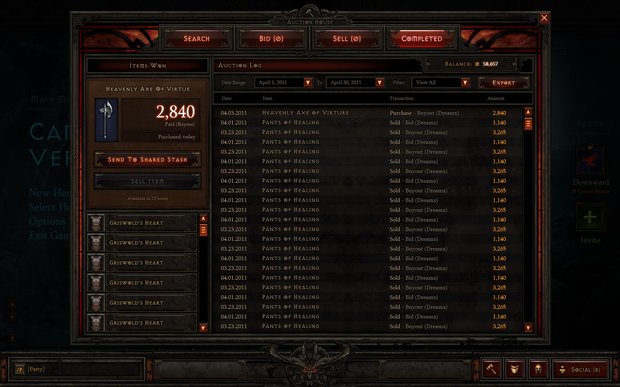The beautiful irony in SimCity and Diablo 3's Auction House going offline today
On March 18, 2014, two important moments took place in the PC gaming space: Maxis released a patch to enable offline play of SimCity, and Diablo 3’s Auction House closed its digital doors. Blizzard’s giving players a week to gather their unsold items before the little, golden gavel vanishes from the game’s UI altogether, but you’re no longer able to buy or sell items for in-game currency or real money.
First, to Diablo--in truth, this is a day that I never expected to come. Fans and critics decried the Auction House within a few days of the game's launch as it became evident that it had a negative impact on all of the game’s other systems. Blizzard built Diablo 3’s loot around it, and rebalanced the game’s difficulty levels to account for players’ ability to simply purchase items they wanted. Its rippling effects were devastating on the long-term replayability of a game that so heavily emphasizes long-term replayability, and made Diablo a much worse game.

Thankfully, the recent release of patch 2.0.1 (which fixed both the loot and difficulty to exist in a post-AH world so perfectly that I re-reviewed Diablo 3 last week), assured that the feature was no longer needed--the Auction House became a vestigial organ in a much evolved creature.
Like the Auction House, SimCity’s online mode became a weakness that impacted every other element of the city builder. Making it online meant Maxis needed to shrink the maximum city size and rebalance the game to force players to rely on their neighbors instead of allowing anyone to make a sprawling, self-reliant city. The ability to play in multiplayer regions was cool, but it flat-out didn't work as advertised, causing lag issues that persisted months after launch. In the early days, Maxis was adamant about the sheer impossibility of even creating an offline mode for SimCity--since-promoted General Manager Lucy Bradshaw commented that "the game was designed for MP, we sim the entire region on the server so this is just not possible.”
And yet, here we are, one year later, with it not only possible, but it like just happened a few minutes ago. "Originally designed from the ground-up as an always-connected experience, Maxis reengineered the game in order to move the calculations locally to the player’s PC or Mac," Maxis recently explained. "Gains in optimization to the GlassBox Engine allow players to have a similar gameplay experience, whether they choose to play Online or Offline."

Before I move on to a “so, what can we learn from this?” thing, let’s first bask in how absolutely beautiful this day is for PC gamers. Blizzard shutting down the Auction House and Maxis finally releasing the long-promised offline patch for SimCity on the same day? I can’t think of anything more poetic, or ironic--both developers needed to strip major features from their games in order to make them much better experiences.
But is it the right call? Should Blizzard and EA have so unequivocally backed off two of the most forward-thinking, 21st century components of their games due to their audiences' demands? In Blizzard's case, the answer is an easy, "Absolutely." However, Maxis's situation is a little trickier. Gamers fear always-online because of the chance that it might go offline and prevent them from playing, and that's just what happened with SimCity. Though the game's balance issues could have been flushed away with a few updates, Maxis had already confirmed the paranoia of millions of gamers--that wasn't going to be solved by anything less drastic than utter capitulation. Too bad.
Sign up to the GamesRadar+ Newsletter
Weekly digests, tales from the communities you love, and more
Hollander Cooper was the Lead Features Editor of GamesRadar+ between 2011 and 2014. After that lengthy stint managing GR's editorial calendar he moved behind the curtain and into the video game industry itself, working as social media manager for EA and as a communications lead at Riot Games. Hollander is currently stationed at Apple as an organic social lead for the App Store and Apple Arcade.



